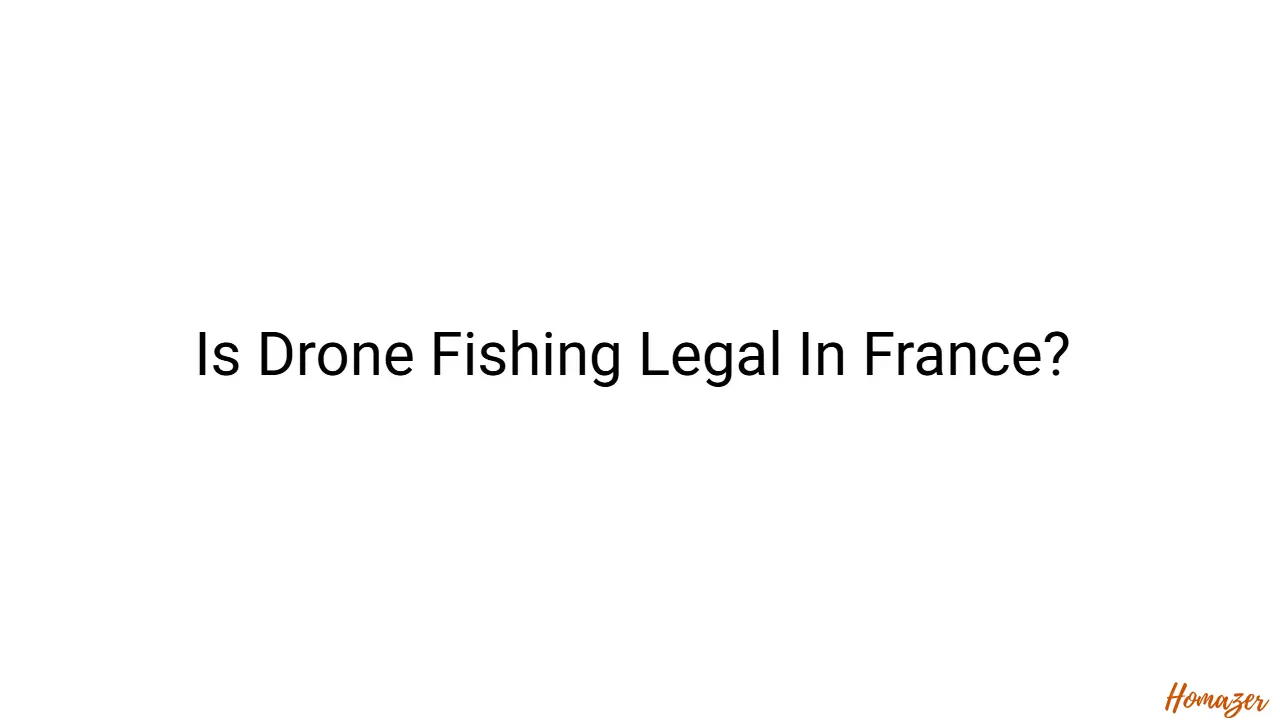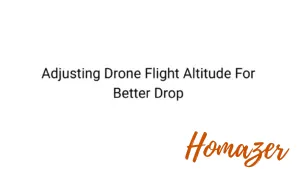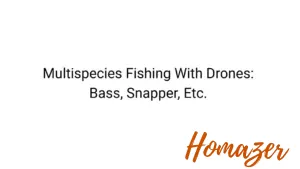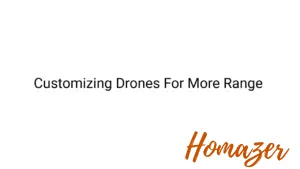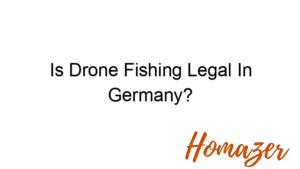Imagine you’re standing by a beautiful French lake, rod in hand, ready for a day of fishing. But instead of casting your line, you’re controlling a small, buzzing drone to help you. Sounds pretty cool, right? But before you start picturing yourself reeling in a prize catch with some high-tech assistance, there’s a vital question to ask: Is drone fishing legal in France? This post will provide a complete look at the laws surrounding drone usage for fishing in France, so you can enjoy your hobby safely and legally. By the end of this article, you’ll know exactly what you can and can’t do, helping to increase your enjoyment of this activity. This should improve your Time on Page and reduce your Bounce Rate. Ready to find out?
Drone Use and French Law: A Quick Overview
France, like many countries, has strict rules for drone operations. These rules cover a wide range of factors, including where you can fly, how high you can go, and what you can do with your drone. They’re designed to protect people, property, and the environment. Failing to follow these regulations can result in serious consequences, including hefty fines. To explore whether using a drone for fishing is permitted, we must first check the general drone laws that apply to everyone. This is because specific fishing regulations must work alongside these general rules.
General Drone Rules in France
The core of French drone law revolves around safety and respect for privacy. You must register your drone if it weighs over a certain amount (usually 800 grams), and you may need a pilot’s license, depending on the type of drone and how you intend to use it. Flying over populated areas, near airports, or at night is usually forbidden, unless you have special permission. Always check the current regulations before each flight, because rules are subject to updates. You should always be able to see your drone, and should operate it carefully, avoiding any risk to people or objects.
- Registration: Drones above a specified weight, often 800g, must be registered with the relevant authorities. This helps track ownership and allows authorities to identify the owner if something goes wrong.
- Pilot Qualifications: Depending on the drone’s use, especially if it’s for commercial purposes or carries certain equipment, a pilot’s license or training certificate may be necessary.
- Flight Restrictions: Flying is typically prohibited over cities, populated areas, or near airports. Night flights are also usually banned.
- Altitude Limits: The general rule is you cannot fly higher than a certain altitude, such as 150 meters (492 feet) above the ground.
- Visual Line of Sight (VLOS): The pilot must maintain visual line of sight with the drone at all times. You can’t use instruments that take the place of your own eyes.
A lot of these general rules are also related to protecting the public’s right to privacy. Using drones with cameras means that they can be used to capture footage of people on private property.
Privacy Laws and Drones
French privacy laws are very strict. Drones equipped with cameras are a significant concern. The authorities take a strong stance against using drones to record images or video that could violate someone’s privacy. This includes capturing footage of private property, or of individuals without their consent. Data protection rules, like those outlined in the General Data Protection Regulation (GDPR), also apply. Misuse could lead to legal action, fines, or other penalties. These laws limit what you can do with a drone to gather information.
- Data Protection Regulations: Laws like GDPR require that personal data is handled correctly. If your drone collects personal data (like people’s faces or license plates), you need to comply.
- Filming Restrictions: Without consent, you cannot film people or their property. Filming public spaces might also be restricted, especially near sensitive areas.
- Privacy Zones: Some areas are considered privacy zones. They are out of bounds for drone operations. These may include residential areas, or the surrounding property of schools and hospitals.
- Penalties for Infringement: Breaking privacy laws can mean significant fines. It can also involve legal action, as well as confiscation of equipment.
- Commercial Use: If your drone use involves business or commerce, the privacy rules are often more stringent.
Drone Fishing Specifics: Legality in France
So, does the general drone law and privacy laws apply to fishing? Let’s get to the important question: Is drone fishing legal in France? The answer is complex. It’s not a straightforward “yes” or “no”. It depends on several factors. These factors include how you’re using the drone, where you’re fishing, and any additional local rules. As a result, you must consider all the aspects of French law surrounding drone usage and fishing. This requires some deep thought.
Restrictions on Fishing with Drones
In France, the use of drones to actively catch fish is generally prohibited. This includes using the drone to carry a fishing line, drop a hook, or retrieve a fish. The authorities consider this a method of fishing that gives an unfair advantage, and disrupts the natural ecosystem. The emphasis is on promoting fair play in fishing. The exact wording of the laws can vary by region. The basic concept is always the same.
- Direct Fishing Techniques: Using a drone to carry a fishing line, deploy a hook, or otherwise directly assist in catching fish is illegal.
- Environmental Concerns: Officials may prohibit drone fishing, as it can disturb the environment and the fish.
- Competitive Advantage: Regulations are in place to ensure fair competition. Drones can provide an unfair advantage.
- Local Regulations: Regional or local authorities might impose additional restrictions on drone fishing.
- Enforcement: Authorities closely monitor fishing activities. Violating rules could mean fines.
Permitted Uses for Drones in Fishing
Though directly catching fish with a drone is usually forbidden, there may be some limited ways a drone can be utilized. Some sources may say you could use a drone to scout a fishing area. It’s also said to be used to spot fish from above. However, these uses are also subject to rules. You need to always respect the privacy of the fishers. This means you must not fly your drone too close to them. The regulations often state these uses must also respect general drone and privacy laws.
- Scouting and Observation: A drone may be used to locate ideal fishing spots or observe fish behavior. It is always important to maintain privacy.
- Mapping and Surveying: Drones can be utilized to survey fishing areas. This can provide valuable information about the underwater environment.
- Avoiding Direct Fishing: The permitted use of drones does not involve directly catching fish. The drone cannot have a hook or line attached.
- Data Collection: Drones can collect information, such as weather conditions and water quality. It can do this using sensors.
- Compliance: Make sure you know about local rules. They can impact how you use your drone.
Examples and Scenarios for Drone Fishing in France
Let’s look at some real-life situations to explain the different aspects of Is drone fishing legal in France? It is important to know that laws can vary according to location. The following examples will assist you in applying the law to your own experiences.
Case Study: Illegal Drone Fishing Attempt
A fisherman was spotted by the authorities using a drone to carry a fishing line and hook. The drone was used to drop the line into the water. This directly violated French fishing regulations. The authorities approached the individual. They seized his drone and issued a significant fine. The fisherman had to pay for breaking the rules.
This is a warning. It is important to respect the fishing laws to prevent negative consequences. The fisherman’s actions show that, generally, direct participation in catching fish is illegal. The example proves how serious the authorities are about enforcing these regulations.
Case Study: Legal Drone Usage for Observation
A group of anglers used a drone to scout a lake. The purpose was to identify potential fishing spots, and study the behavior of fish. They did not attach any fishing gear to the drone. They flew their drone above a remote part of the lake. They were in compliance with French drone laws, including regulations regarding altitude and privacy. They were careful to ensure they didn’t film other people. The result was that they enjoyed a successful and legal fishing experience. This case study demonstrates how drones can be used responsibly for fishing.
Scenario 1: Using a Drone to Drop Bait
- Situation: You want to use a drone to drop bait.
- Legality: This is likely illegal. Direct use of a drone to assist in fishing is generally forbidden.
- Consequences: You could face fines, confiscation of your drone, and possible legal action.
Scenario 2: Using a Drone to Film a Fishing Trip
- Situation: You want to use a drone to film your fishing trip.
- Legality: You can film your fishing trip, but you must respect privacy laws. You must obtain permission if you are filming other individuals or private property.
- Consequences: Failure to respect privacy laws could mean fines, or legal action.
Frequently Asked Questions
Question: Can I use a drone to carry my fishing line?
Answer: No, this is generally illegal in France. Directly using a drone to assist in catching fish violates fishing regulations.
Question: Are there any specific regions where drone fishing is allowed?
Answer: No, the general rule is that drone fishing, as in directly catching fish, is prohibited across France. Always check local and regional regulations for any specific exceptions.
Question: Can I fly my drone over a lake to scout for fish?
Answer: Yes, you can use your drone to scout for fish, but you must comply with general drone laws. Keep your drone within line of sight, respect altitude limits, and respect privacy laws.
Question: What happens if I break the drone fishing rules?
Answer: You could face fines, have your drone confiscated, and possibly face legal action. The penalties depend on the severity of the violation.
Question: Where can I find the most up-to-date information on drone regulations?
Answer: Check the official website of the French Civil Aviation Authority (DGAC) and any local fishing authorities.
Final Thoughts
So, we’ve explored the question: Is drone fishing legal in France? The simple answer is no. Using a drone to directly catch fish is generally prohibited. This includes using it to carry lines, drop hooks, or retrieve fish. However, you can use drones for observation, scouting, and data gathering, if you follow French drone laws and local fishing rules. These rules center on safety, privacy, and environmental protection. For a good experience, you should always check the latest regulations. It’s smart to check with local authorities for region-specific guidelines. To be confident, always follow all rules regarding altitude, privacy, and flight zones. The main thing is to respect the environment and the laws. By taking the time to fully understand the regulations and operate your drone responsibly, you can make sure that your fishing experience is both enjoyable and legal. Happy fishing!

